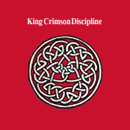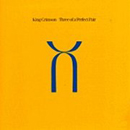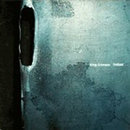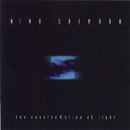by Clayton Walnum

After the release of Red, and except for the live album USA, King Crimson disappeared. Most fans figured that the KC juggernaut had run its course, and with the flagging interest in progressive rock (Fripp hates to hear KC described as progressive rock; sorry, Robert), it didn't seem that there was much hope of ever seeing another KC studio album. Seven years went by, when what seemed to be almost out of nowhere, King Crimson was reborn with an all-new direction.
The one thing that identifies this era of KC more than any other is the work of Adrian Belew, who joined the new KC incarnation. In its previous life, KC could never seem to stay with a singer, having had four singers over the course of five albums. But from 1981 to the present, Belew has been the voice of King Crimson. And so, it just seems appropriate to call these the Adrian Belew years.
Note that, as I said in the previous installment of this omnibus review, A Young Person's Guide to All Things Crimson covers only the band's studio output. King Crimson has also released well over 20 live albums that feature virtually every incarnation of the group. In fact, with KC's special subscription CD offerings, I really have no idea how many live albums have actually been released. Let's just say that there's a lot of live KC out there!
Discipline (1981)
 The 1980s brought us a very different King Crimson from the past incarnations. For one thing, the album Discipline welcomed vocalist/guitarist Adrian Belew to the fold. Of the old KC, only Fripp and Bruford remained, with the bass chores being taken over by the amazing Tony Levin. Having two axemen enabled KC to create some truly spectacular guitar convolutions. In fact, all of the Belew KC albums feature not only Belew's very original guitar solos, but also complex interplays between Fripp and Belew. Also, this album displays a much more vocal- and song-oriented KC. Considering Belew's vocal talent, that comes as no surprise. Although all the music on Discipline is credited to King Crimson, Belew's singular style is all over almost every song.
The 1980s brought us a very different King Crimson from the past incarnations. For one thing, the album Discipline welcomed vocalist/guitarist Adrian Belew to the fold. Of the old KC, only Fripp and Bruford remained, with the bass chores being taken over by the amazing Tony Levin. Having two axemen enabled KC to create some truly spectacular guitar convolutions. In fact, all of the Belew KC albums feature not only Belew's very original guitar solos, but also complex interplays between Fripp and Belew. Also, this album displays a much more vocal- and song-oriented KC. Considering Belew's vocal talent, that comes as no surprise. Although all the music on Discipline is credited to King Crimson, Belew's singular style is all over almost every song.
And unlike most of KC's output up to this point, Discipline is a collection of songs. Most of the tracks on this album are in the four- to five-minute range. Moreover, most of the songs feature great vocal melodies that, if you're familiar with Belew's solo work, you'd have to agree must have come from Belew's pen. Whether it's the frenzied "Frame By Frame," the gentle "Matte Kudasai," or the bizarre "Indiscipline," Belew's trademark vocals and melodies make each of these tracks a new type of KC experience. One is tempted to say that, in this incarnation of KC, Belew's influence overshadows even Fripp's. Still, the old KC sometimes rears its head, such as the roaring Frippish guitars in parts of "Indiscipline" (brings to mind the "Larks' Tongues In Aspic" days).
Beat (1982)
 Beat was the second of what many people consider to be a KC trilogy, a set of three related albums that started with Discipline and ended with Three Of A Perfect Pair. First, the album covers of all three albums look as if they were designed to be a three-album set, what with the solid-color backgrounds trimmed with a single graphic and a single line of text. Also, Beat continues the musical path that the newly incarnated KC followed on the earlier release, Discipline, fitting in perfectly with the group's new musical vision. The group also comprises the same four musicians, Robert Fripp, Adrian Belew, Tony Levin, and Bill Bruford.
Beat was the second of what many people consider to be a KC trilogy, a set of three related albums that started with Discipline and ended with Three Of A Perfect Pair. First, the album covers of all three albums look as if they were designed to be a three-album set, what with the solid-color backgrounds trimmed with a single graphic and a single line of text. Also, Beat continues the musical path that the newly incarnated KC followed on the earlier release, Discipline, fitting in perfectly with the group's new musical vision. The group also comprises the same four musicians, Robert Fripp, Adrian Belew, Tony Levin, and Bill Bruford.
Adrian Belew is as strong a presence in this disc as he was on the previous one. The compositions are again very song oriented, with most tracks being in the four- to five-minute range and featuring well defined melodies and the extraordinary convoluted dual guitar parts of Fripp and Belew. This album also features what I consider to be one of Belew's finest compositions, "Heartbeat," a musically complex, yet entirely accessible, song that's been covered several times by other artists. One artist who covered this track is Al Kooper (of Blues Project; Blood, Sweat, and Tears; and Super Session fame), who, on his live album, Soul Of A Man: Live, commented, "I can't even begin to tell you how difficult this song is to play, cause Adrian Belew is nuts!" Beat is probably the best album from this era of King Crimson, a disc that, many years later, I still listen to with awe and wonderment.
Three Of A Perfect Pair (1983)
 Three Of A Perfect Pair (what a great title) is not only the last of King Crimson's trilogy of the 1980's, but is also the last studio album KC would release for another decade. Just about everything I've said about the previous two albums can be applied here: The group comprises the same musicians, the compositions follow the same musical direction (though a little less song oriented), the Belew influence is strong (although this album is every bit as much Fripp's show), and so on. Three Of A Perfect Pair is nearly as great as its predecessor, Beat, falling short only by not having a track as perfect as "Heartbeat" and the fact that the recording is a bit lackluster, though not enough to affect listening enjoyment. In fact, some people would just call the recording "warm."
Three Of A Perfect Pair (what a great title) is not only the last of King Crimson's trilogy of the 1980's, but is also the last studio album KC would release for another decade. Just about everything I've said about the previous two albums can be applied here: The group comprises the same musicians, the compositions follow the same musical direction (though a little less song oriented), the Belew influence is strong (although this album is every bit as much Fripp's show), and so on. Three Of A Perfect Pair is nearly as great as its predecessor, Beat, falling short only by not having a track as perfect as "Heartbeat" and the fact that the recording is a bit lackluster, though not enough to affect listening enjoyment. In fact, some people would just call the recording "warm."
What really sets this album off from the previous two, however, is KC's nod to their past, courtesy of the instrumental tracks "Nuages (That Which Passes, Passes Like Clouds)," "Industry," "No Warning," and especially "Larks' Tongues in Aspic, Part III." These tracks revisit KC's dark side, with pulsing beats, dreamy "Frippertronics," and raging guitar solos. Expect goose bumps! The track "Dig Me," which is a vocal number rather than an instrumental, is downright avant-garde, much more experimental than any tracks on Discipline and Beat. The same can be said about the nightmarish instrumental "No Warning." In fact, this album is the perfect mix of the original KC sound with the new, Belew-influenced sound, and was a suitable way to end the 80s.
Vroom (1994)
 It would be ten long years after the release of Three Of A Perfect Pair before a new King Crimson studio album would appear in the record store racks. But when it did, it would be an EP (only 31 minutes) of new material by a KC line-up affectionately known as the double trio, comprising two guitarists (Robert Fripp and Adrian Belew), two bassists (Trey Gunn and Tony Levin), and two drummers (Bill Bruford and Pat Mastelotto). Apparently, Fripp was so overjoyed with his new lineup that he couldn't wait to get the music out there. Thus, this EP, which is actually a recording of the group's rehearsals, was released as a hint of what was to come. (Or, to quote Mr. Fripp, "We present VROOOM as a calling card, rather than a love letter, to those generous enough to give it ears." Four of the six songs on this EP were to appear in more polished form on following album THRAK.
It would be ten long years after the release of Three Of A Perfect Pair before a new King Crimson studio album would appear in the record store racks. But when it did, it would be an EP (only 31 minutes) of new material by a KC line-up affectionately known as the double trio, comprising two guitarists (Robert Fripp and Adrian Belew), two bassists (Trey Gunn and Tony Levin), and two drummers (Bill Bruford and Pat Mastelotto). Apparently, Fripp was so overjoyed with his new lineup that he couldn't wait to get the music out there. Thus, this EP, which is actually a recording of the group's rehearsals, was released as a hint of what was to come. (Or, to quote Mr. Fripp, "We present VROOOM as a calling card, rather than a love letter, to those generous enough to give it ears." Four of the six songs on this EP were to appear in more polished form on following album THRAK.
The CD's opening track "VROOOM," reminiscent of the series of "Larks Tongues" compositions, positively explodes from the speakers, heralding the return of a more experimental and powerhouse KC. The same is true of another instrumental here, "THRAK," a monstrous (in a good way) barrage of counterpoint rhythms, distorted guitars, and blasting percussion. Not for the weak hearted! Belew's vocal and compositional presence still makes itself known on this EP, but the sound, to these ears, is more Fripp than Belew. The guitars scream, the vocals shriek, the percussion roars. KC was back with a vengeance. About the only break your ears get from the sonic onslaught is on the beautiful closing song, "One Time," one of the four tracks that would appear again on the following album, THRAK.
THRAK (1995)
 THRAK is the album for which the EP VROOOM was a warm up. Four of the 15 tracks on this disc appeared on the previous EP. Here, however, those four songs appear in their finished form and with full studio production. The group on this album is still the double trio from the VROOOM EP, and the sound continues in the direction forged on that EP. Now, however, Belew gets to do a lot more singing. Although there are 15 tracks on this album, and they are all on the short side, several of the songs segue into each other such that they appear to be extended compositions.
THRAK is the album for which the EP VROOOM was a warm up. Four of the 15 tracks on this disc appeared on the previous EP. Here, however, those four songs appear in their finished form and with full studio production. The group on this album is still the double trio from the VROOOM EP, and the sound continues in the direction forged on that EP. Now, however, Belew gets to do a lot more singing. Although there are 15 tracks on this album, and they are all on the short side, several of the songs segue into each other such that they appear to be extended compositions.
Tracks such as "VROOOM," "Dinosaur," "THRAK," and "VROOOM VROOOM" are among the best things KC has released, the first and last having strong stylistic ties to the landmark Larks Tongues in Aspic album. Other terrific tracks, such as the Lennon-esque "Walking On Air," as well as "People," and "Sex Sleep Eat Drink Dream" look back to the more song-oriented KC of the 80s. In fact, for folks who are looking to get started with King Crimson, this album would be a great place to start, as it offers a wide range of KC's compositional styles, from the gentle to the ferocious. This album, along with Larks Tongues in Aspic, is among my personal favorite KC recordings.
The ConstruKction Of Light (2000)
 It took another long five years before King Crimson went back into the studio. (Over that time, Fripp stayed busy releasing many live KC albums.) ConstruKction Of Light is a weaker album than its predecessor, THRAK, but is still a great album and was one of my favorite albums for the year 2000. (Even a slightly weak KC album is better than 99% of the other stuff out there.) Here, the double trio is gone, with a trimmer KC featuring Robert Fripp (of course!), Adrian Belew, Trey Gunn, and Pat Mastelotto, providing the talent. Gone -- not permanently, I hope -- are Bill Bruford and Tony Levin.
It took another long five years before King Crimson went back into the studio. (Over that time, Fripp stayed busy releasing many live KC albums.) ConstruKction Of Light is a weaker album than its predecessor, THRAK, but is still a great album and was one of my favorite albums for the year 2000. (Even a slightly weak KC album is better than 99% of the other stuff out there.) Here, the double trio is gone, with a trimmer KC featuring Robert Fripp (of course!), Adrian Belew, Trey Gunn, and Pat Mastelotto, providing the talent. Gone -- not permanently, I hope -- are Bill Bruford and Tony Levin.
If anyone wonders whether Fripp and Belew actually have a sense of humor, they need look no further than the opening track on this disc, "ProzaKc Blues," which is a send-up of the blues genre with hilarious lyrics ("The thing about depression is, well, you just can't let it get you down") and a ? shall we say, unique ?vocal style -- Adrian Belew as a black blues singer! Definitely a bizarre and silly opening track that probably would have fit better later in the album, but still a lot of fun.
The rest of the album is more traditional KC fare, with several Belew-sung shorter tracks, as well as a few longer instrumental tracks. The short songs have that trademark Fripp/Belew sound that harkens back to the 80s KC, whereas the instrumentals are more restrained than the thunderous stuff from THRAK, but still often immensely powerful. This album also features the next in the "Larks Tongues" series of compositions, "Larks Tongues In Aspic, Part IV," probably the best track on the album, along with the nine-minute "FraKctured."
As of this writing, that brings you up to date with King Crimson's studio recordings. There are plenty of other KC-related albums to explore, however, including a library of collections, live recordings, and the so-called ProjeKct albums. The latter are recordings from club dates that Fripp did with various KC subgroups who performed mostly improvisational fare, with the idea of developing new KC material. King Crimson's full discography is huge, to say the least.
Links: King Crimson
Copyright © by ProgressiveWorld.net All Right Reserved.
Published on: 2001-10-21 (3207 reads)

